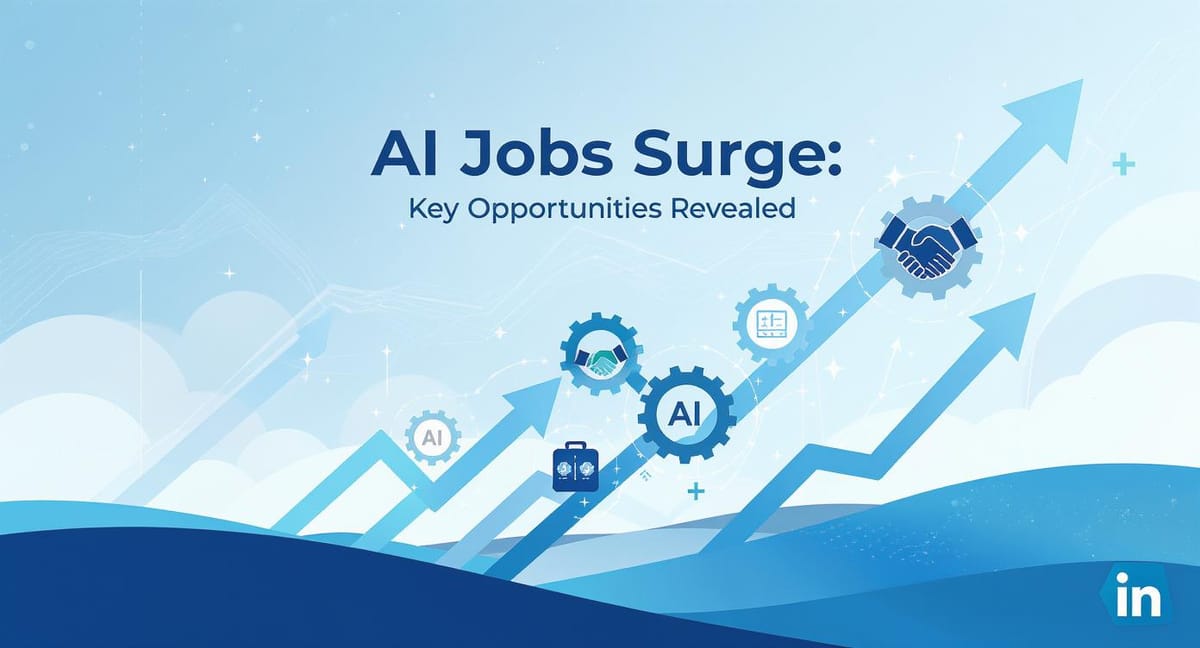AI Jobs Surge: Key Opportunities in a Booming Market
Explore the expanding AI job market and the key opportunities.

In a time when the fear of artificial intelligence taking over jobs looms over many, a hidden job market is rapidly expanding, offering a treasure trove of opportunities. According to the World Economic Forum, a staggering 97 million new AI-related jobs are being created, surpassing the number of positions being displaced. Yet, a significant problem persists: companies are struggling to find qualified talent to fill these roles.
From tech giants to smaller enterprises, the demand for AI-skilled workers is skyrocketing, but there's a catch - many of these lucrative positions do not require you to be a programmer. Instead, the focus is shifting towards individuals who can bridge AI capabilities with real-world business needs. This blog post delves into the specific AI job categories that are currently offering six-figure salaries and the skills required to seize these opportunities.
The Booming AI Development Sector
Perhaps unsurprisingly, AI development roles form the backbone of this booming job market. Positions such as machine learning engineers, software developers, and data scientists are in high demand, with salaries ranging from $120,000 to over $200,000 annually. These roles necessitate a deep understanding of AI technologies and the ability to create innovative solutions that propel businesses forward.
“AI development jobs are at the forefront of this revolution, requiring cutting-edge technical skills and offering highly competitive salaries.”
AI Implementation Specialists: The Unsung Heroes
A more subtle yet equally critical category is AI implementation specialists. These are the strategists and managers who deploy AI solutions within businesses. Contrary to popular belief, their primary role is not to code algorithms but to integrate AI into existing business operations effectively. The average salary ranges from $100,000 to $180,000, proving this is no secondary position.
“AI implementation specialists are crucial in transforming theoretical AI capabilities into practical, actionable business solutions.”
The Rise of Human-AI Collaboration Roles
The World Economic Forum highlights the emergence of human-AI collaboration roles as the fastest-growing segment. These positions focus on leveraging AI in tandem with human skills to achieve results that neither could alone, including roles such as AI-powered content strategists and human-AI team coordinators.
“These collaboration roles are about enhancing human capabilities with AI, fostering innovation across industries.”
Managing The AI Revolution
AI management and oversight roles are pivotal as companies seek to ensure their AI systems function optimally. These positions do not require extensive technical expertise but rather strong business acumen and strategic thinking. The ability to manage AI systems and ensure they align with business objectives is becoming increasingly valuable.
“Effective AI management ensures that investments in AI technologies yield significant business returns.”
Navigating The Skills Gap
Despite the surging demand, a disconnect remains: companies cannot find individuals with the right skills. Many AI job postings have been vacant for over two months. The most sought-after competencies are not programming skills but rather business acumen and project management abilities.
“Companies value the ability to solve business problems and communicate effectively over technical programming skills.”
Strategic Positioning in the AI Job Market
For those seeking to enter this field, positioning is key. Identifying one’s niche within an industry and mastering a handful of AI tools can set applicants apart. The focus should be on demonstrating the business impact of AI solutions rather than technical prowess.
“Specializing in AI applications in specific industries increases your market value and attractiveness to potential employers.”
Embarking on a New Career Path
The roadmap to success in AI-related careers involves strategic learning and effective networking. By focusing on specific industries, enhancing relevant skills, and crafting a compelling portfolio, prospective candidates can align themselves with the burgeoning AI market demand. The transition is not only possible but potentially lucrative for those who act swiftly.
“Building a career in AI begins with a strategic approach to learning and application, highlighting real-world business outcomes over technical details.”
Conclusion: Seizing the AI Revolution
The AI job market presents unprecedented opportunities for those ready to embrace the change. While the technical chops are always valuable, the real gold lies in understanding business dynamics and deploying AI strategically. As the job landscape continues to shift, the biggest question is not if these changes will unfold but how you will position yourself to benefit.
Embracing this dynamic field of AI could mean the difference between being swept away by the tide of new technology or riding its wave to professional success. The time to act is now, while the demand is high and competition remains manageable.